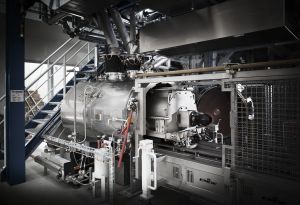Today, the newly built pilot plant of Celitement GmbH was opened officially on Campus North of Karlsruhe Institute of Technology (KIT). The plant will supply 100 kg of the environmentally compatible cement Celitement® daily. Production of this cement is expected to consume only half of the energy compared to conventional Portland cement, and emission of carbon dioxide (CO2) into the environment presumably will also be halved.
“Commissioning of the plant is a milestone on the way from the laboratory to maturity of this environmentally compatible cement. Celitement is an excellent example of the innovative capacity of KIT and successful technology transfer,” said Dr. Peter Fritz, Vice President of KIT. About six years ago, KIT scientists had the first idea for this new construction material. Meanwhile, Celitement GmbH, a spin-off of the four inventors, KIT, and the industry partner Schwenk, has invested five million euros in the further development of this cement for use in industry.
“This is an important contribution to the efficient use of resources,” emphasized the Baden-Württemberg Minister of the Environment Franz Untersteller, “because cement production still is one of the most energy-intensive industrial processes. With the Celitement pilot plant, we now have the chance to sustainably change this situation. The best energy is the energy we do not need.”
Presently, cement works with an annual production of three billion tons of cement are having a share of about 5% in the worldwide CO2 emissions. CO2 emissions of cement production exceed those of global air traffic by a factor of three to four. If worldwide cement production would be changed to the Celitement® process, half a billion tons of CO2 would not be generated on the resources side alone – with global effects on climate protection. Compared to conventional Portland cement, production of Celitement® also saves resources, as only one third of the usual amount of lime is needed and no gypsum additive is required.
The Federal Ministry of Education and Research is granting institutional funding in the amount of about EUR 232 million per year for the research of Karlsruhe Institute of Technology contributing to solving big and urgent problems of the society, science, and industry. For the scientific support of Celitement® on its way from the laboratory scale to industrial application, it additionally provided EUR 4.3 million. “Excellent minds and high-performance infrastructure secure the bases of life of man in the long term and create the foundation for competitive industry,” underlined Ministerialdirigent Dr. Karl Eugen Huthmacher from the BMBF. “Celitement is an excellent example of how KIT designs our future by application-oriented, provident research. I am very pleased that the high commitment of Celitement GmbH and the Schwenk Group now produces first fruit.”
“As industry partner, we consider this project a model of how industry and research can jointly pursue new approaches to developing promising products and successfully face ecological challenges,” said Gerhard Hirth, Director of Schwenk Zement KG.
During today’s celebration of the start of the pilot plant, Celitement GmbH was also handed over the award “Selected Place 2011” in the competition “365 Places in the Land of Ideas” for its project “Celitement® - Environmentally Compatible Cement Production.” It was pointed out by the jury that Celitement® is an example of innovations made in Germany: It links economic motivation with responsibility for the environment and sustainability. “365 Places in the Land of Ideas” is a competition organized by the initiative “Deutschland – Land der Ideen” (Germany – land of ideas) together with Deutsche Bank under the auspices of Federal President Christian Wulff.
Karlsruhe Institute of Technology (KIT) is one of Europe’s leading energy research establishments. The KIT Energy Center pools fundamental research with applied research into all relevant energy sources for industry, households, services, and mobility. Holistic assessment of the energy cycle also covers conversion processes and energy efficiency. The KIT Energy Center links competences in engineering and science with know-how in economics, the humanities, and social science as well as law. The activities of the KIT Energy Center are organized in seven topics: Energy conversion, renewable energies, energy storage and distribution, efficient energy use, fusion technology, nuclear power and safety, and energy systems analysis.
In close partnership with society, KIT develops solutions for urgent challenges – from climate change, energy transition and sustainable use of natural resources to artificial intelligence, sovereignty and an aging population. As The University in the Helmholtz Association, KIT unites scientific excellence from insight to application-driven research under one roof – and is thus in a unique position to drive this transformation. As a University of Excellence, KIT offers its more than 10,000 employees and 22,800 students outstanding opportunities to shape a sustainable and resilient future. KIT – Science for Impact.

